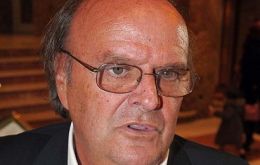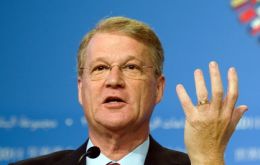MercoPress. South Atlantic News Agency
Economy
-
Thursday, October 6th 2011 - 05:01 UTC
“Occupy Wall Street” movement spreads from New York across the US

Demonstrators from New York City to San Francisco took to the streets Wednesday to protest what they call a growing wealth disparity between large US corporations and average citizens in the wake of the financial crisis.
-
Thursday, October 6th 2011 - 02:32 UTC
Falklands and Punta Arenas work to establish closer agriculture technical links

Representatives from the Falkland Islands Agriculture Department and private sector visited Punta Arenas in the extreme south of Chile to establish closer commercial, technical and academic links related to farming development.
-
Thursday, October 6th 2011 - 02:16 UTC
Uruguayan auto assembly industry exempt of Brazil’s IPI 30% tax increase

In the framework of the so called Plan Maior, Brazil adopted measures to stimulate its industry with the purpose of increasing productivity and containing competition from Chinese produce in its domestic market.
-
Thursday, October 6th 2011 - 01:55 UTC
“Mercosur won’t destroy European agriculture”, says EU business lobby

The head of Business-Europe International Relations said Wednesday that a free trade agreement between the European Union and Mercosur “would not destroy European agriculture” in spite of fears from farmers.
-
Wednesday, October 5th 2011 - 22:05 UTC
Canadian rating agency upgrades Argentina, but warns about external shock

DBRS rating agency from Canada upgraded on Wednesday its ratings on Argentina's long-term foreign and local currency securities to “B” from B (low). The trends have been revised to Stable.
-
Wednesday, October 5th 2011 - 21:44 UTC
Global financial crisis “starting to affect” Argentina says manufacturers union

The head of the Argentine Industrial Union (UIA), José Ignacio de Mendiguren, warned on Wednesday that Argentina “is starting to be affected” by the global financial crisis, furthering that the country “is not protected” against the situation.
-
Wednesday, October 5th 2011 - 21:39 UTC
Operation Fire Wall: IMF will also chip in funds to protect Spain and Italy

The International Monetary Fund could buy Spanish or Italian bonds alongside the Euro zone bailout fund if needed, to help boost investor confidence in those countries, the IMF Europe head Antonio Borges said on Wednesday.
-
Wednesday, October 5th 2011 - 08:26 UTC
Anaemic Spain: no end in sight for soaring unemployment

The number of people filing for unemployment benefits in Spain shot up by nearly 100,000 in September, a surprisingly big increase even in a month that tends to be bad for workers as vacation season contracts expires.
-
Wednesday, October 5th 2011 - 08:02 UTC
Corporations call for ambitious EU/Mercosur deal and hope farm issues do not ‘derail the project’

Major European corporations called on political leaders for an “ambitious and balanced” European Union-Mercosur trade agreement and asked that ‘agriculture issues’ impacts do not derail the project.
-
Wednesday, October 5th 2011 - 07:52 UTC
Wool prices suffer considerable tumble in September but still above a year ago

Wool prices suffered a considerable tumble during September in line with the bearish market for commodities as a result of global economic uncertainty, although values are still considerably higher than a year ago.
